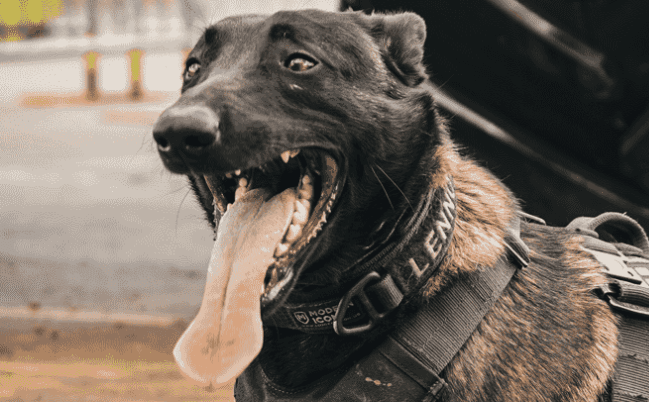1. Introduction
K9 dogs, also known as police or service dogs, are renowned for their remarkable ability to detect a wide range of substances, from illegal drugs to explosives. These dogs possess an extraordinary sense of smell, which allows them to track scents and identify specific compounds in challenging environments. With increasing concerns over smoking, vaping, and other nicotine-based products, it’s natural to wonder: Can K9 dogs smell nicotine? In this article, we’ll explore whether K9s are capable of detecting nicotine, how their powerful noses work, and the challenges that come with nicotine detection.
2. How Do K9 Dogs Work?
K9 dogs are trained to use their exceptional sense of smell to detect specific substances. A dog’s olfactory system is far more advanced than humans, with around 300 million olfactory receptors compared to just 6 million in humans. This enables them to detect even the faintest trace of a scent. Their training involves associating specific smells with actions or alerts, allowing them to recognize and indicate the presence of drugs, explosives, and even human remains.
K9 dogs are highly specialized, with their training often focusing on detecting substances that pose a threat to public safety, such as narcotics and explosives. However, some dogs may also be trained to detect other substances, including nicotine.
3. Can K9 Dogs Smell Nicotine?
Yes, K9 dogs can smell nicotine, but it’s not as common or straightforward as detecting other substances like illegal drugs. Nicotine is a relatively small and volatile molecule, making it more challenging for K9s to detect compared to more persistent substances like marijuana or heroin. However, when nicotine residue is present—such as on surfaces, clothing, or certain objects—K9s may be able to detect it.

In most cases, the detection of nicotine is more likely to happen when there are nicotine residues left behind from tobacco or vaping products. For example, a K9 may be able to smell nicotine residue on a cigarette pack, vape pen, or in a room where smoking occurred. Nicotine vapor itself dissipates quickly, which makes it much harder for dogs to track in open air.
4. What Substances Can K9 Dogs Detect?
K9 dogs are typically trained to detect a variety of substances, including:
- Narcotics: Such as marijuana, cocaine, methamphetamine, and heroin.
- Explosives: Including TNT, dynamite, and other explosive materials.
- Tobacco: Including cigarettes, cigars, and smokeless tobacco products.
- Illegal Drugs: Synthetic substances, fentanyl, and ecstasy.
- Human Remains: Used in search and rescue operations.
While nicotine is not typically a primary focus in most K9 training programs, some specialized teams may train dogs to detect nicotine products such as cigarettes, e-cigarettes, or vape devices, especially in high-security or contraband detection contexts.
5. Challenges in Nicotine Detection by K9s
Detecting nicotine presents unique challenges for K9 dogs:
- Nicotine’s Volatility: Nicotine is a volatile substance, especially in vapor form, as found in e-cigarettes and vapes. It evaporates quickly, making it difficult for dogs to track in open air.
- Small Molecule Size: Nicotine is a relatively small molecule compared to other drugs or explosives. Its small size makes it harder to detect, especially when only minute traces are left behind.
- Residue vs. Vapor: K9s are more likely to detect nicotine residue left behind on objects like vape pens, cigarette butts, or smoking-related items than they are to detect nicotine vapor in the air. The vapor is much harder to detect as it quickly disperses.
- Environmental Factors: In environments with many competing smells, such as crowded public areas or areas with multiple fragrances, K9s may find it difficult to isolate nicotine as a target scent.
6. Training K9 Dogs for Specific Substances
Training a K9 dog to detect nicotine involves introducing the dog to specific nicotine-laden items such as tobacco products or e-cigarettes. The dog will learn to associate the scent of nicotine with a reward, and over time, the dog will be able to alert their handler when they detect nicotine.
However, most K9 training focuses on detecting illicit drugs or explosives, as these substances pose a more significant risk to public safety. Training K9s to specifically detect nicotine might be more commonly found in situations like contraband detection or security screening.
7. Are There Legal Implications for Nicotine Detection?
Although nicotine is not an illegal substance, there are certain legal contexts where detecting nicotine can have implications:
- Smuggling of Tobacco Products: K9s may be used to detect large shipments of illicit tobacco products or smuggled nicotine products. In such cases, nicotine detection could be part of a larger effort to combat illegal tobacco trade.
- Underage Vaping: Some regions have laws that regulate the sale of nicotine products to minors. In cases where minors are found with vaping products, K9s trained to detect nicotine might help identify prohibited products.
- Public Health Concerns: In some areas, there are regulations regarding vaping in public spaces, and nicotine detection could become relevant in law enforcement or public health enforcement activities.
8. Where to Get Help with Nicotine Products
If you’re looking for nicotine products such as nicotine pouches, vaping accessories, or even nicotine-free alternatives, visit SnuffMint. We offer a wide range of nicotine products to suit different preferences. For personalized assistance or if you have any questions about our products, feel free to contact us via WhatsApp at +852-90568182.
9. FAQs
1. Can K9 dogs smell nicotine?
Yes, K9 dogs can smell nicotine, especially if there are nicotine residues on objects like cigarettes, vape devices, or in areas where smoking has occurred.
2. How effective are K9s at detecting nicotine vapor?
Nicotine vapor dissipates quickly, making it much harder for K9s to detect in open air. They are more effective at detecting nicotine residues.
3. Are K9s typically trained to detect nicotine?
While most K9s are trained to detect illicit drugs and explosives, some can be trained to detect nicotine, especially in the context of security, contraband detection, or enforcement of smoking regulations.
4. What substances do K9s typically detect?
K9s are trained to detect narcotics, explosives, tobacco products, human remains, and other illegal substances.
5. Can K9s detect nicotine in public places?
Yes, if nicotine residues are present, K9s may be able to detect it in public spaces, such as on clothing, belongings, or surfaces.
Conclusion
K9s have an extraordinary sense of smell and are capable of detecting nicotine, particularly when it’s in the form of residue on objects or surfaces. However, the volatility and small molecular size of nicotine make it more difficult for K9s to detect in vapor form. While nicotine detection is not a primary focus of most K9 training programs, it can be important in specific situations, such as contraband detection or enforcement of regulations. Understanding the capabilities and limitations of K9s in nicotine detection helps us better appreciate their specialized training and the valuable roles they play in law enforcement and security.






